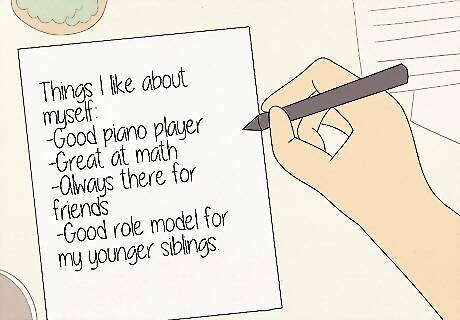
views
Promoting Yourself

Focus on specific talents and interests. Pursue and promote particular interests, whether you want to be famous or to make a noticeable college application. Decide what you’re good at, figure out concrete ways to apply your talents, and communicate your skills to others clearly. For example, if you love computer science, join relevant clubs, like a coding or robotics club. Don’t join 10 activities at school just because you think it’ll look good on a college application. If you’re applying to a job, ask your references to promote specific skills. Ask them, “Would you relate how I trained new employees? I'd like to highlight that I can master new abilities and communicate information clearly.”

Do more than the bare minimum. Always try to exceed your own expectations and those others place on you. People will notice when you go above and beyond at work, school, or in your relationships. For instance, your teachers will notice you more if you participate in class and go to extra help sessions, even if you don’t get the highest grades in the class.

Put some personality into emails, applications, and other correspondence. Adding a personal touch will help you stand out, especially in written forms of communication. Include a personal detail about yourself, like a memorable story or reference to a face-to-face conversation you had with someone. For example, if you want a college application essay to get noticed, don’t write something generic about how you look up to a parent or teacher. Instead, tell an interesting story. Maybe you were on a field trip to the science museum, and you, your biology teacher, and a couple friends got stuck in an elevator. While you were stuck, you had a deep conversation that inspired you to pursue biomedical research.

Use flattery with moderation. As long as you don’t go overboard, a bit of flattery can get you noticed. Try to offer specific, sincere compliments instead of heaping on piles of fake praise. For instance, suppose your teacher marked up the first draft of your paper with red ink, but their feedback helped you write a fantastic final draft. You could say, "I really appreciate the time you put into critiquing my first draft. Your feedback helped me focus on the topic, and I ended up learning a lot from this project."

Follow up after interviews, meeting someone, or making a pitch. Failing to follow up is a sure way to fly under the radar. When you send someone a note or email, mention something specific about yourself or your conversation so they’ll remember talking to you. For instance, after a job interview or meeting a company executive, say something like, “Thanks for describing the company’s manufacturing process with such detail, and for recommending Jane Doe’s eye-opening article on the industry.”
Meeting New People

Start a conversation with someone new every day. Challenge yourself to talk to at least a couple new people every day. It can be tough to approach new people at school or work, especially if you’re naturally shy. Try to relax, remind yourself that everyone gets nervous, and take a step out of your comfort zone. For example, instead of eating lunch alone, look for someone you’ve never met and say, “Hey there! Is this seat taken?” Later on, they’ll probably notice you when you pass them in the hallway and say hello. If you’re nervous, remember that everyone has insecurities and gets shy, even if they seem totally confident on the outside.

Smile and make eye contact. When you meet someone or have a conversation, smile naturally and look them in the eye. Try not to fake a smile and, if you have to, think of something that cracks you up without fail. When making eye contact, don’t stare without blinking, but look at the person directly to show you’re paying attention to them.

Ask thoughtful questions, but don’t interrogate. Whether you’re having lunch with someone new or at a work meeting, try to think of thoughtful questions that show you’re engaged in the moment. When the person responds, try to pay attention to them instead of just thinking of something interesting to say. For example, if you’re at a new school, ask the person sitting next to you, “What do you do for fun? Are you in any clubs or do you play a sport?” Instead of asking another unrelated question after they respond, say something like, “Oh cool! I’ve never played hockey, but it’s fun to watch. Do lots of people go to games and show school spirit?” Once they respond, try mentioning an activity that you are interested in to build the conversation.

Develop your own interests and hobbies. From your music taste to snowboarding, an interest or hobby can make you more noticeable. However, you don't want to just adopt the interests of your crush or a popular person to get them to notice you. Figure out what you enjoy and do it. If you love a music genre, listen to as many tracks and artists as you can and learn about its evolution. Developing an interest or hobby can help you spark conversations and get noticed by like-minded people. If you already have an interesting hobby, you can use it to start conversations as well.

Get involved in clubs and activities. Joining a club or sports team is another great way to meet new people and make deeper connections. Since everyone involved already has that activity in common, it can be a little easier to form relationships with your teammates. Running for student government is another great way to get recognized by your peers. If your workplace has a company team, join it or support it. For example, if there’s a company softball team but you’re not the best athlete, go to the game, cheer for your team, and bring a cooler with refreshments.

Don’t pass on invitations to social gatherings. Whether it’s a school dance or a company cocktail hour, do your best to attend social events. You have to put yourself out there if you want people to notice you. If you stay home, you could be passing up a good time or networking opportunity. If you’re an introvert, try to use it to your advantage at social events. Listen and observe while all the extroverts talk. Then, when the opportunity presents itself, you could say to someone, “I heard you mention Roald Dahl earlier. He’s my favorite author!” Whether the person is your crush or an executive at work, they’ll notice that you paid attention to them and sparked a meaningful conversation.
Developing Confidence

Make a list of things you like about yourself. Confidence leaves a lasting impression, and it’s harder to put yourself out there if you don’t like yourself. Make a mental list of your qualities, accomplishments, and other things that make you feel good about yourself. If it helps, write them down and read the list out loud to remind yourself just how special you are. For example, remind yourself that you’re a good piano player, great at math, always there for your friends, and a good role model for your younger siblings.

Practice good personal hygiene. Being well-groomed can build confidence and self-empowerment, so take great care of your teeth, hair, and general cleanliness. Putting effort into your personal hygiene will show your classmates, colleagues, or crush that you care about both health and appearance. Brush your teeth daily, shower regularly, and wash up thoroughly from head to toe when you bathe. Try to keep your hair and fingernails neat, wear clean clothes, and use deodorant.

Maintain good posture. Standing up straight conveys that you're comfortable in your own skin. Keep your chest lifted and shoulders back, hold your head up, and try not to slouch. While you want to maintain good posture, try not to be too rigid. Find a balance between being comfortable and using your posture to project confidence.

Work on developing a healthy body image. Remind yourself that there’s no ideal body size or shape, and everyone has something about themselves that they would change. You’ll feel more at ease about interacting with others and allowing yourself to be noticed. Try to focus on things about your face and body that you love. Compliment yourself regularly and, if it helps, write down a list of positive traits. When you're feeling insecure, read the list and remind yourself that you're a unique, fantastic person. If getting in better shape would help your confidence level, you can try eating healthier and walking, jogging, or other forms of exercise. However, try not to think about yourself negatively. Instead, focus on improving your health and taking great care of yourself.

Practice speaking with more confidence. It’s easy to go unnoticed if you speak quietly or mumble. When you speak, work on pronouncing words clearly. Try to fill your belly with air and use your breath to support your voice. If you get nervous about talking to people or speaking in front of a group, take a deep breath and relax. Imagine something calming, like a safe location that makes you happy. Remind yourself that you have nothing to be afraid of, and everyone mixes up their words or gets nervous now and then.

Dress for success. Develop a sense of style that shows off your personality, empowers you, and makes you comfortable. You don’t have to blow your budget (or allowance) on an expensive wardrobe, but wear clothes that fit, compliment your body, and are clean and wrinkle-free. Looking disheveled might get you noticed, but you want people to notice you for positive things. If you want to develop a new style or add to your current look, try browsing Pinterest to get inspiration. Save the images of outfits that are most appealing to you.


















Comments
0 comment